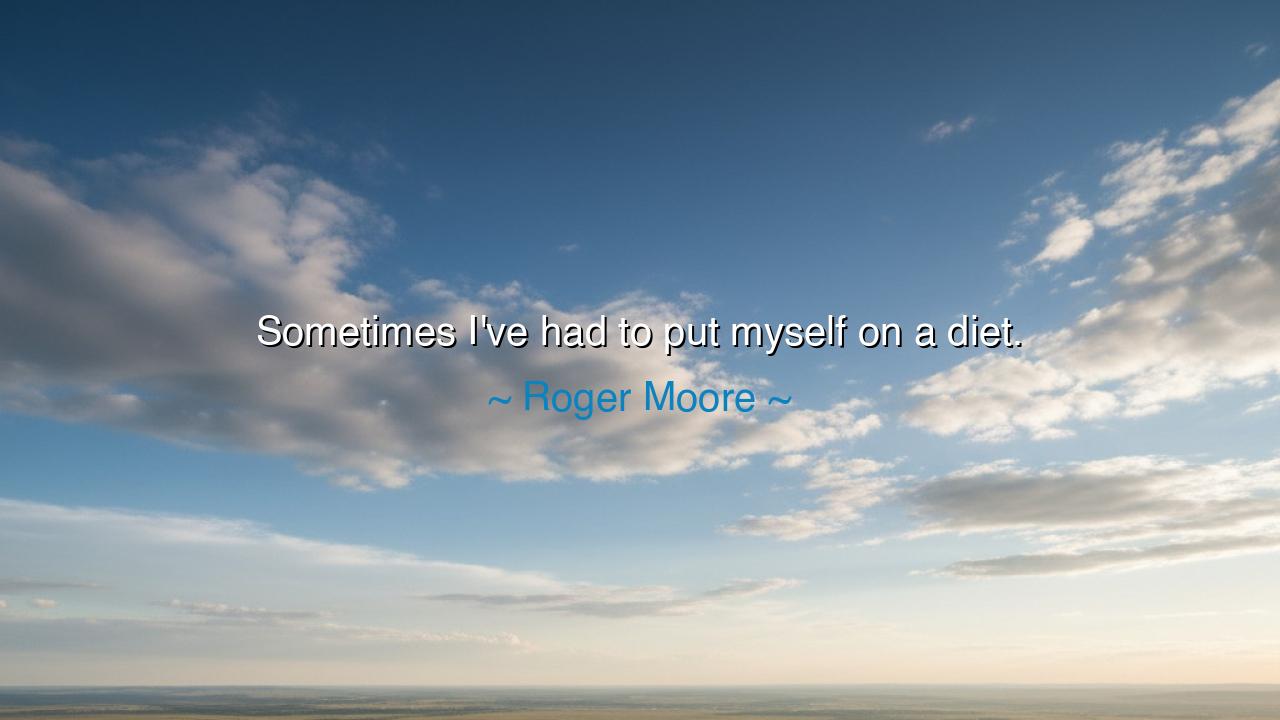
Sometimes I've had to put myself on a diet.






When Roger Moore said, “Sometimes I’ve had to put myself on a diet,” his words carried far more than a casual reflection on food or weight. Beneath their modest humor lies a truth both ancient and profound — the eternal need for self-discipline, the understanding that freedom without restraint leads to decay, and that mastery over the self is the truest form of strength. For in every age, the wise have known that life, in all its sweetness, demands balance — that joy, unchecked, becomes indulgence, and indulgence, unguarded, becomes bondage.
To “put oneself on a diet” is not merely to restrict what one eats, but to reclaim control over one’s impulses — to remember that the mind must rule the body, and not the other way around. In this simple act of self-limitation lies the essence of wisdom: to recognize when desire has grown louder than reason, and to gently, but firmly, guide it back into harmony. Moore’s confession is not of weakness, but of awareness — the quiet admission that even those who appear composed and confident must sometimes call themselves to order. The greatest kings and artists, the strongest warriors and thinkers, have all faced the same battle within — the battle between pleasure and purpose.
The ancients knew this truth well. In ancient Greece, the philosopher Socrates often spoke of temperance as one of the highest virtues — sophrosyne, the balance between appetite and wisdom. He believed that a man who could master his body could master his destiny. The Stoics, too, lived by this law, teaching that happiness is not found in the endless pursuit of comfort, but in the calm control of one’s desires. And so, to “put oneself on a diet,” as Moore said, is not a trivial act of vanity — it is a practice in self-governance, a reminder that freedom is maintained through mindful restraint.
Consider the example of Alexander the Great, conqueror of worlds. Though he possessed wealth and power beyond imagination, he kept himself from indulgence during his campaigns. He ate little, slept little, and demanded of his body the endurance of his soldiers. When one of his generals offered him water during a long march through the desert, Alexander poured it out upon the sand, saying he would not drink while his men suffered thirst. His greatness was not in his victories alone, but in his ability to govern his own will, to diet his desires so that his purpose might remain pure.
Roger Moore, though living in a world of glamour and excess, understood something similar — that even amidst luxury, one must pause, reflect, and restrain. His “diet” is symbolic not only of food but of all forms of excess — fame, indulgence, pleasure, comfort. To choose moderation is to choose clarity. To say, “I must stop, I must control, I must be aware,” is to step back into one’s own power. For the man who can deny himself in small things strengthens the will to face the greater trials of life. Discipline, then, becomes the quiet architect of dignity.
Yet there is tenderness in his words too — an acknowledgment that discipline need not be harsh, but compassionate. To put oneself on a diet is not to punish the body, but to care for it wisely; not to reject pleasure, but to ensure that pleasure does not become poison. This is the ancient art of balance — to enjoy life’s gifts with gratitude, yet never be enslaved by them. As the Buddha once taught, the string of a lute must be neither too tight nor too loose — too tight, and it will snap; too loose, and it will not sing. The wise life, like music, requires tension in harmony.
And so, the lesson is timeless: govern yourself, and you will never be ruled by your appetites. When you find yourself drifting into excess — in eating, in speaking, in working, or in resting — pause, and set yourself upon a “diet” of mindfulness. Learn to listen to your inner balance, to know when enough is enough. Let restraint be your ally, not your enemy. For every act of moderation is an act of strength; every choice of balance is a choice for peace.
My listener, remember this: even kings must eat humbly, even heroes must rest, and even the wise must remind themselves to begin again. To “put yourself on a diet,” in whatever form life requires, is to reclaim mastery over your fate. It is not a denial of joy — it is the path to lasting freedom. For the one who can say “enough” when the world says “more” has already conquered not just hunger, but the restless heart of humanity itself.






AAdministratorAdministrator
Welcome, honored guests. Please leave a comment, we will respond soon